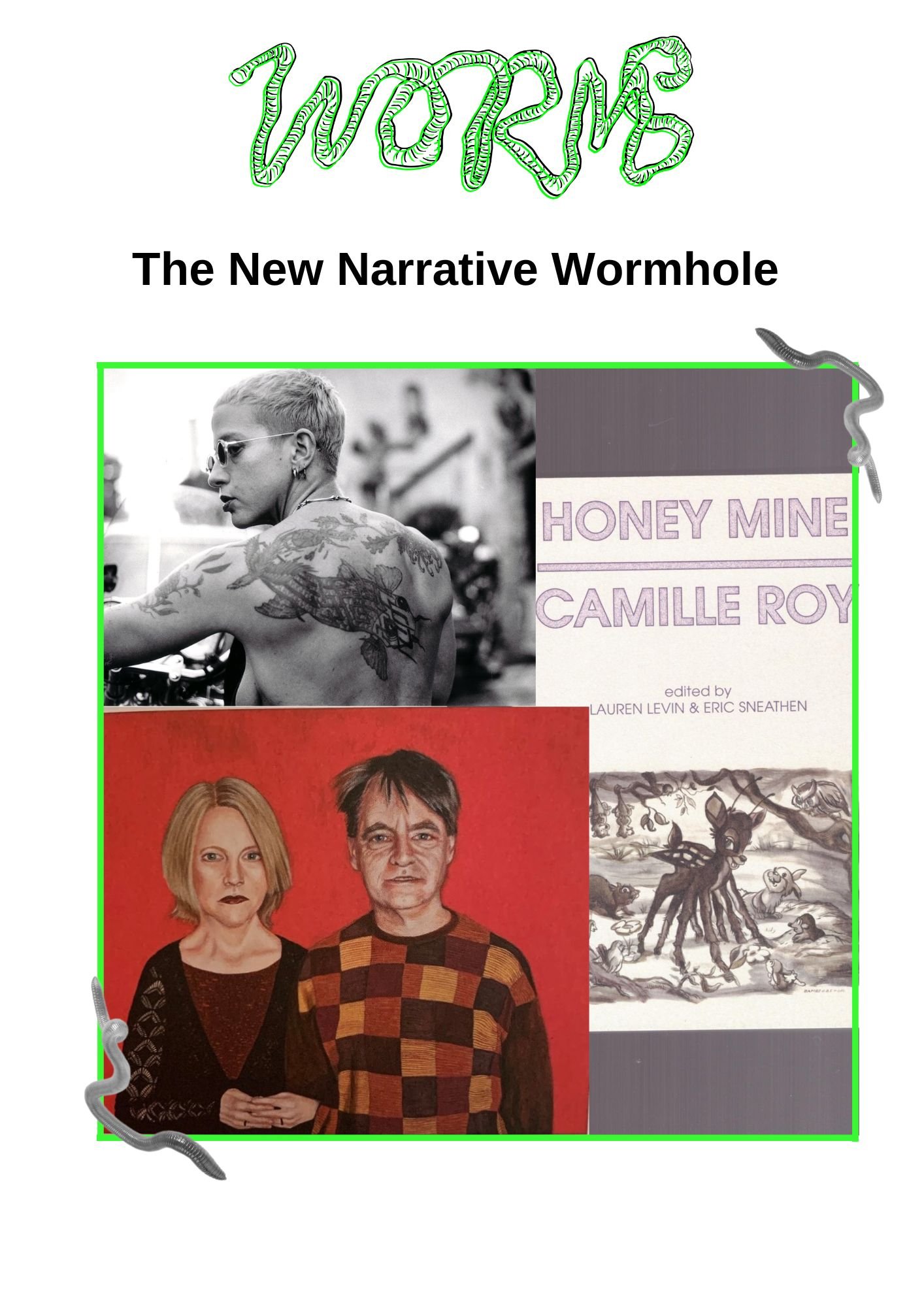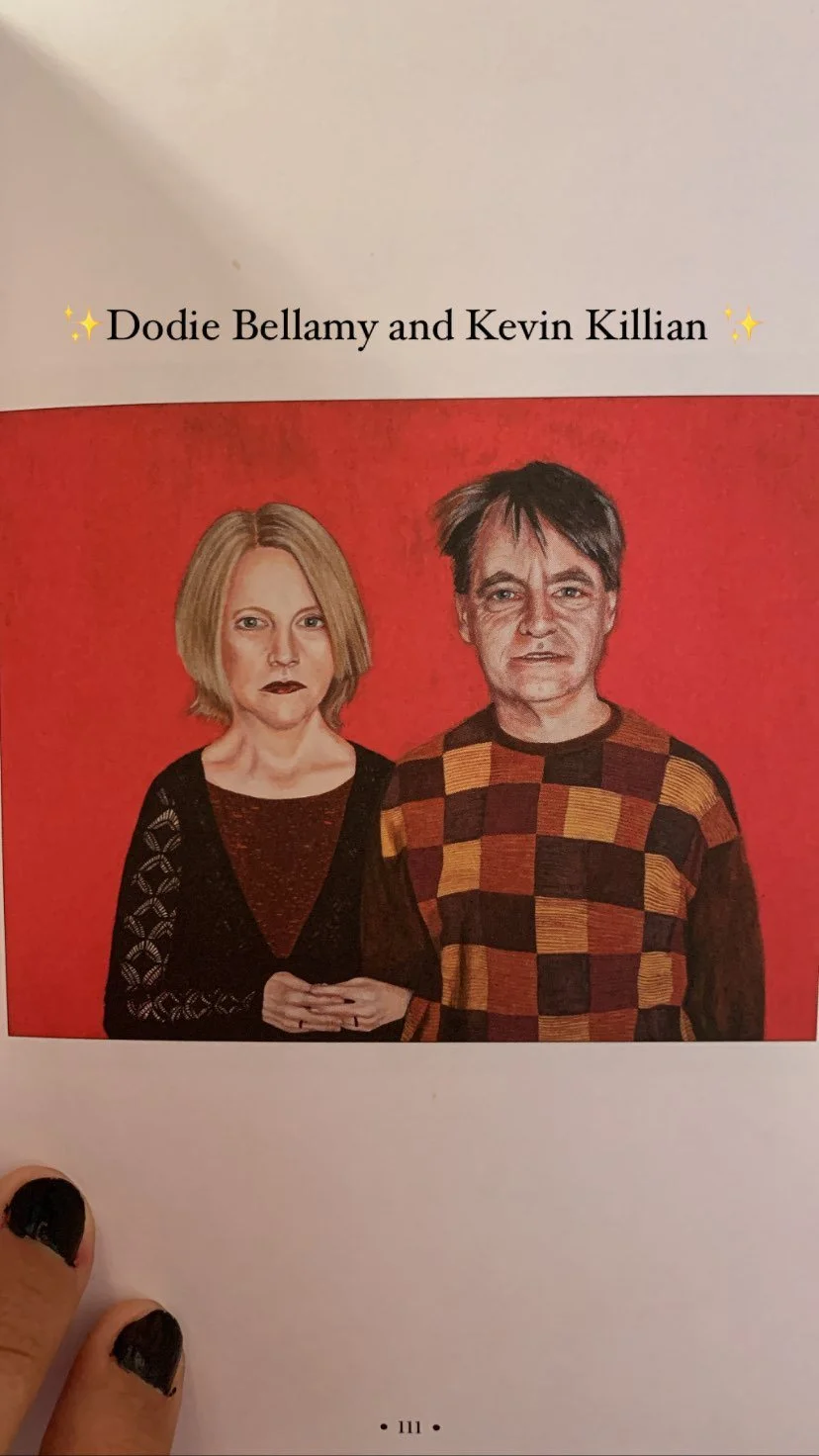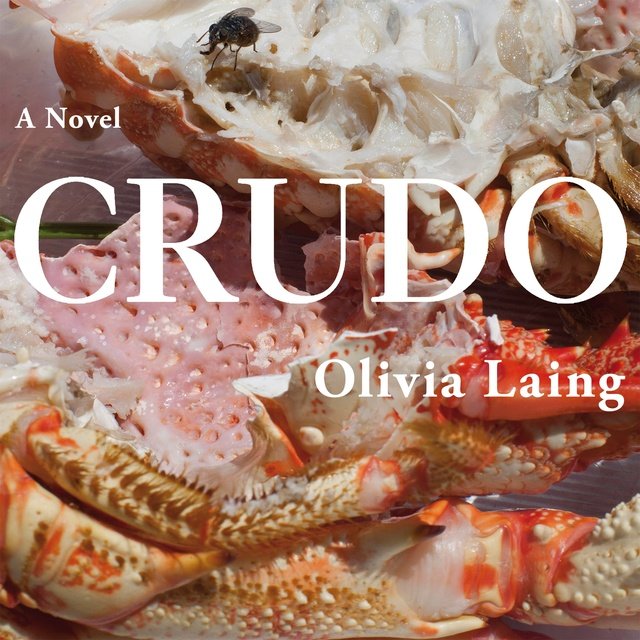The New Narrative Wormhole
Dearest Fertilisers,
Happy New Year! To celebrate the start of 2023, we’ve brought some exclusive content from Worms 5, probably the last before Worms 6 comes out (which you can pre-order here) and we start to peek in between the covers of our latest issue.
This week we’re bringing you:
The Camille Roy Interview with Clem Macleod.
Dodie Bellamy’s Literary Barf (Interview with Clem Macleod)
These interviews with two pioneers of the New Narrative movement are a good insight into the kinds of writing that was explored during the time. If you know Worms you know how much we love New Narrative and its writers.
New Narrative defines itself as:
“a movement and theory of experimental writing launched in San Francisco in the late 1970s by Robert Glück and Bruce Boone. New Narrative strove to represent subjective experience honestly without pretence that a text can be absolutely objective nor its meaning absolutely fluid”
And, as is our custom, we’ve also put together a New Narrative reading list for you too.
Remember you can get Worms 5 here for a lot more of this kind of stuff.
Worms x
Camille Roy
5-stars. I laughed so much during this number. Lesbian coming-of-age book. I could really 'see' a lot of the scenarios playing out in real time. - Clem Macleod
CITY LIGHTS LIVE! Camille Roy in conversation with Eileen Myles
Dodie Bellamy
Dodie Bellamy Is On Our Mind Ed. by Anthony Huberman and Jeanne Gerrity
I haven’t read any of Bellamy’s texts, apart from an excerpt of her Barf Manifesto I came across during an internet deep dive, so reading a book of essays about the impact and force of the author feels like a retroactive activity, a reading that should’ve been done after the fact but that enacts as a warm-up exercise of sorts. I’ve particularly enjoyed the comparison between experimental writing and barf; the lack of structure, the hideousness, the intimacy, the rejected. It’s been particularly moving to read these essays written from true admirers and friends of Bellamy’s as I feel this transmits a certain urgency to the writing that dons it with a touching earnestness. I also think the book itself is a beautiful edition. I’m a great fan of annotating but the print feels almost too precious to soil. I have overcome my apprehension though. - Arcadia Molinas
Writers Who Love Too Much: New Narrative Writing 1977 - 1997 Ed. by Dodie Bellamy and Kevin Killian
I loved this article so much. It’s about New Narrative and Dodie Bellamy and Kevin Killian’s book ‘Writers Who Love Too Much’ which has become my new bible. I came across it via Bellamy’s biography ‘Dodie Bellamy is on our mind’ which is also amazing. “New Narrative writers prove that you can believe wholeheartedly in what you say and do and still have a sense of humour about it” - Clem Macleod
Bee Reaved's excess gives me permission to explode with foam and froth of memories and childlike fits of living in a world of constant grief and trash. Dodie Bellamy unzips a suitcase of kept files, mundane walks around the neighbourhood or whatever, insecure thoughts of stalkers and internet mourners, gofund me pages and youtube searches, shit stuck to the intricate grooves of shoes. "Kevin and Dodie" destroyed me. A conversation between living writers always nourishes me, talking about topics they both cared about, speaking back and forth about art shows they've attended and childhood sexual experiences. There is an abruptness of Kevin's illness. The hospital room arrives and in the conversation, Kevin no longer speaks. I have been in this hospital room before, in other forms, in my own life. Everything breaks off. It's true, if we survive this car chase (the world) it is a miracle in its own. we are lurching forward with all our might, crashing, spinning, loving. - Delia Rainey
I started Dodie Bellamy's 'The Letters of Mina Harker' which is perfectly mad. I'm in a bit of a Dodie wormhole at the moment. I've been dipping in and out of 'Writers Who Love too Much' which is a collection of New Narrative writing edited by Bellamy and Kevin Killian. I loved the way the New Narrative writers put their bodies into their work. It really brought up a lot of the theories put forward by Lauren Fournier in 'Autotheory as Feminist Practise in Art, Writing and Criticism' - especially the question of what it means to place a woman into a philosophical context, not only as a writer but also as the subject. - Clem Macleod
Kathy Acker
“Initially I found the book to be quite a sexy read, to the point where I felt uncomfortable reading it on the subway. Something about meticulous, experimental descriptions of what having an orgasm feels like was strange to read on my morning commute next to so many unassuming strangers… really made me think about the horniness-level on public transport during the 50 Shades of Grey boom. However, the sexiness quietens down as the narrative progresses and the tone of the book shifts and transforms in surprising ways. The strange thing about the book is that while you’re reading it you seem to be reading a series of images or disembodied scenes but simultaneously a firm narrative thread with key realisations between the characters sustains the book throughout. All these surreal scenes and dream sequences spin a tale of radicalisation amongst a group of women trapped in the cages of patriarchy and heteronormativity.” - Arcadia Molinas
I’m Very Into You: Correspondence 1995 - 1996 by Kathy Acker and McKenzie Wark
"how friends who have just become friends position themselves for love."
“Beautiful epistolary exchange between two icons. From Bataille and Blanchot to Beavis and Butthead, Kathy Acker and McKenzie Wark blaze through the academic (despite Acker's protests of, 'this isn't a very academic email') and the gossip of everyday. It is fascinating to read this testament to a recently defunct time; the era of email, an actualised postal service, still foreign to the world of instant messaging. The form yields itself to easy reading regardless of the heady topics the two thinkers take on at times.
Ultimately throughout these emails we have two queers talking queerness and their discomfort with labels: gay, bi, boy, girl. Acker veers towards the masculine ('sometimes I fetishise the masculine... spreading legs and drinking beer and grunting...and sweating and being stupid and rubbing your crotch...it turns me on. Must be sort of a mirror...(Am I being clear?) I've got to get over my fears around the feminine...oh all this shitty past...the sexist society past'), Wark, is uncomfortable with the masculine (Wark says of himself - 'I'm not often dick-centred these days when I get horny').
As these two try to draw out their three-night fling they talk about their sexual history, past relationships and attempt to bridge the gap of space and time that separates them. They try to forge a common (although community is a concept discussed at length through Bataille and Blanchot) language.” - Arcadia Molinas
Philosophy for Spiders: On the Low Theory of Kathy Acker by McKenzie Wark
Blood and Guts in High School by Kathy Acker
I would argue that this is Acker's most influential and lasting work. In it the protagonist ‘Janey’ navigates the world as a young woman being taught how to ‘become a whore.’ The narrative to me was less important than the fragments of references from literature and conversations that the author had clearly had around certain subjects. This needs to be re-read every few years. It’s an artwork in its own right.
Great Expectations by Kathy Acker
Kathy Acker is undeniably the pioneer of new narrative–and much like Blood and Guts in High School–Great Expectations showcases Acker’s unfettered literary anarchy. Reinterpreting Charles Dickens’s original novel by transporting it to a modern day New York City, we’re strung along through our main characters' identities switches, jumping across centuries, into a punk phenomenon of sex and violence. I’d say this is the more experimental of Acker, mostly because of the way she has incorporated a critical analysis of modern literature through a feminist definition. With great resistance against the original text, Acker moves with a tendency toward her own motives, fabulations, and greatest desires. A quote that stayed with me, page 75:
‘If you want to understand an event, always increase its (your perspective) complexity.’
Crudo by Olivia Laing
A story in which Laing inhabits the person of Kathy Acker as a way to explore the boundaries between her and Acker’s biography and use Acker as a sort of screen for her own experiences, migrating from the personal ‘I’ to the more distant and impersonal ‘she’. - Caitlin McLoughlin
Triggered by her readings of the American writer Kathy Acker, Crudo was composed over seven weeks. Writing in a bracing and racy picaresque style, Laing adopts the third-person character “Kathy” that Acker herself often uses. The result is a hilarious mash-up between Acker’s emotional realism and taste for transgression, and the events of Laing’s very twenty-first-century life as she vacations in Italy, updates social media, and plans her small wedding. The book begins breathlessly, with one of the best openings in recent memory.
“Kathy, by which I mean I, was getting married,” Laing writes. “Kathy, by which I mean I, had just got off a plane from New York.”
Becoming Kathy Acker: An Interview with Olivia Laing
Chris Kraus interviews Olivia Laing about her process of writing ‘Crudo’ ? Yes.
From 1988, on the occasion of the opening of his inaugural show of his shotgun paintings, at the October Gallery. This is a fairly rare interview with William Burroughs by Kathy Acker, a great punk/postmodern/experimental writer, originally released, I think, on video by the Institute of Contemporary Art in London although it is no longer listed in their catalog. This particular copy comes from Dutch television.
The interview was filmed at the October Gallery in London, some time before the deaths of both participants in 1997.
Cookie Mueller
Walking Through Clearwater in a Pool Painted Black
Read this review by Callie Hitchcock.
Top Stories
In Worms 5 we had a feature on the founding and legacy of Top Stories. With the reprint last year of the entire anthology, we interviewed Anne Turyn about what it was like to run a literary magazine at a time of unrivalled artistic influence in the US.



















